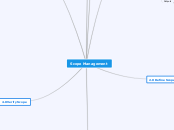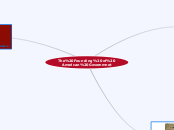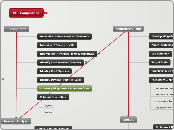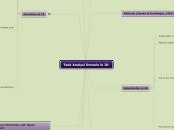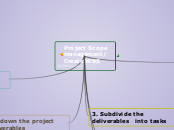Scope Management
4.0 Verify Scope
as before for CHANGES
also accepted deliverables will necessitate updates to the plan, risk register etc as well as status or update reports
Those deliverables not accepted and the reasons why. May result in change to requirements or change to production process.
Accepted deliverables
Formal acceptance/'sign-off' from the customer/sponsor
Inspection
Measuring
Examining
Verification
against requirements and
acceptance criteria
Validated deliverables
Those deliverables having passed through the Project Quality Control process and are now ready for 'sign-off'.
Now we see how, as mentioned at 1.0, this document helps to ensure that what was requested is what is delivered.
Seen before as an output of 3.0
Formalised acceptance of the deliverables.
Review with customer/sponsor to ensure
satisfaction
5.0 Control Scope
as before for CHANGES
e.g. Requirements Documentation
PMP updates
Updates to specific components of the PMP depending on nature of Scope Control activities carried out e.g. change to Scope Baseline
Change Requests
Self explanatory. Requests go through the Integrated Change Request process seen before at PM401
Organisational Process Assets Updates
'lessons learned' other important information for future project or operational work
Performance Measurements
Variance Analysis
Performance Measurements used to determine variance form Scope Baseline. Determine cause and severity and whether corrective action is required.
Seen before but in this context existing control procedures, montioring and reporting methods. May be part of a PMO depending on the maturity of the organisation.
PMO seen before in PM401
Work Performance Information
Current project progress, what's underway, what's completed, how the project is tracking, what performance is being achieved (performance indicators)
Project Management Plan (PMP
Seen before in PM401
Specific components of the PMP such as:
Scope Baseline
Scope Management Plan
Change Management Plan
Configuration Management Plan
Requirements Management Plan
The process of monitoring status of the project and product
and managing changes to the SCOPE BASELINE
3.0 Create WBS
Updates to 'other' Project documents
for e.g. creating the WBS may generate the need for CHANGES. If approved they may necessitate updating of project documents - requirements documentation, scope statement, etc.
Scope Baseline
Self explanatory
Scope statement
WBS
WBS Dictionary
WBS dictionary
Describes the components of the WBS in more detail
WBS
The deliverable oriented decomposed work to be done
Progressively more detail per level
Students are to produce a WBS as an LO
Decomposition
Using organisation guidelines (company PMO)
The analogy approach
The top-down approach
The bottom-up approach - smallest bit and roll them up
Mind-mapping approach
This is a BIG topic might need group discussion to decide what to include. Summaries, key points, detail v overview etc
Seen before
Produced as an outcome of 2.0
Reinforce project flow
WBS is a deliverable-oriented grouping of the work involved in a project. It defines the total scope of the project and provides the basis for planning and managing project schedules, costs, and changes.
Work Packages
2.0 Define Scope
Scope Statement
A scope statement is used to develop and confirm a common understanding of the project scope. It should include
a project justification
a brief description of the project’s products
a summary of all project deliverables
a statement of what determines project success
the exclusions, constraints and assumptions
Students are to produce a SCOPE STATEMENT as an LO
Tools and
Techniques
Expert Judgement
Product Analysis
Identifying Alternatives
Workshops
Develop the idea of assumptions, constraints, risks, analysis
as part of this process
Organisational Process Assets
Other project assets - e.g. templates etc
'Lessons learned' from previous projects
Company policy and procedure
Seen before 1.0 as an output now becomes an input of 2.0
Now we can introduce the concept of FLOW in project planning. How the output of one process feeds into another.
Seen before in 1.0
Essentially what is IN scope and what is OUT of scope
We can first talk about understanding and analysis of
RISKS, CONSTRAINTS here
Once we have the authority to proceed via the charter then....During the PLANNING stage (project management process 5 phases) we understand more about the project and define the detail
1.0 Collect Requirements
Outputs
Requirements Traceability Matrix
Develop the idea of CHANGE CONTROL and how
Links requirements to origins and traces activity throughout project. Helps to ensure that what was requested is what is delivered.
Requirements Management Plan
We can first mention CHANGE CONTROL here
Follows on from the initial documentation and sets out
how requirements are managed and throughout the project
Requirements Documentation
Matches requirement to business objective
lots of information on this. Need to edit ourselves to ensure
effectiveness
Tools and
Techniques
Interviews
Focus Groups
Workshops
Questionnaires
Prototyping
Observation
Method selection may depend on
project complexity
time/cost constraints
company culture (congruence)
results criteria
detail them all and get the students to
select the 'best' method relevant to the scenario
Inputs
Stakeholder Register
We've seen this in PM401 and know what it is. From here we determine who will have the expertise/experience/authority to help with requirements gathering. This will have been developed in assessment 1 activity PM401
Project Charter
Made need to refer to an exemplar or template, look at simple charter created in assessment 1 activity 3 PM401
Definition
The requirements of the project - what is it producing
Main topic
Also need to talk about the need to ensure good Scope Management procedures to guard against SCOPE CREEP
Here we need to establish the plurality of Project Management. Talk about the SCOPE of the PRODUCT and the SCOPE of the PROJECT.
Define and discuss SCOPE in the context of
Planning. What has already happened at the Planning
stage? What has been produced before we get into
the detailed stuff!
